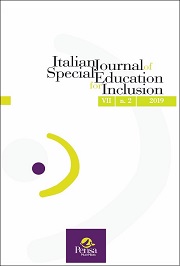Bilingual inclusive education program for deaf students at the Barozzi Institute of Milan: findings of the research on socio-emotional condition for native signer students
DOI:
https://doi.org/10.7346/sipes-02-2019-22Abstract
It is known the construction of quality, especially when considered within the teaching-learning process, encompasses multiple aspects, including undoubtedly the achievement of educational objectives, but also, and above all, the well-being perceived by all those who, with different roles, share the same reality. Understanding the conditions that can contribute to the construction of a
positive educational context is therefore essential to the feasibility of the underlying principles of a fully inclusive approach. The contribution, analyzing the data emerged from the Quality of Inclusion and Deafness research conducted by the Center for Studies and Research on Disability and Marginality (CeDisMa) of the Catholic University of Milan, pays specific attention to the interpersonal dynamics and the socio-emotional experiences matured by the deaf students attending the comprehensive institute Barozzi of Milan, for years engaged in the realization of didactic and educational lines in favor of deaf students. The presented thoughts are intended, on the one hand, to foster the knowledge of projects aimed at experimenting with educational models and programs based on bilingual paths, and on the other, to support the scientific debate on the evidence reached in support of an increasingly fair and inclusive educational culture.


